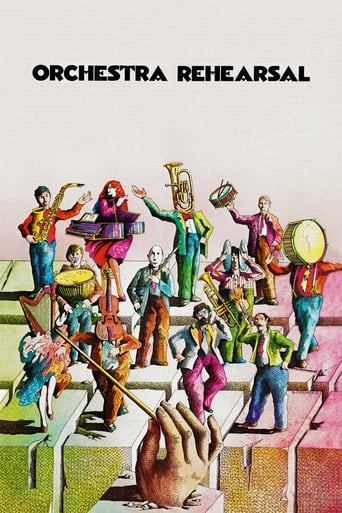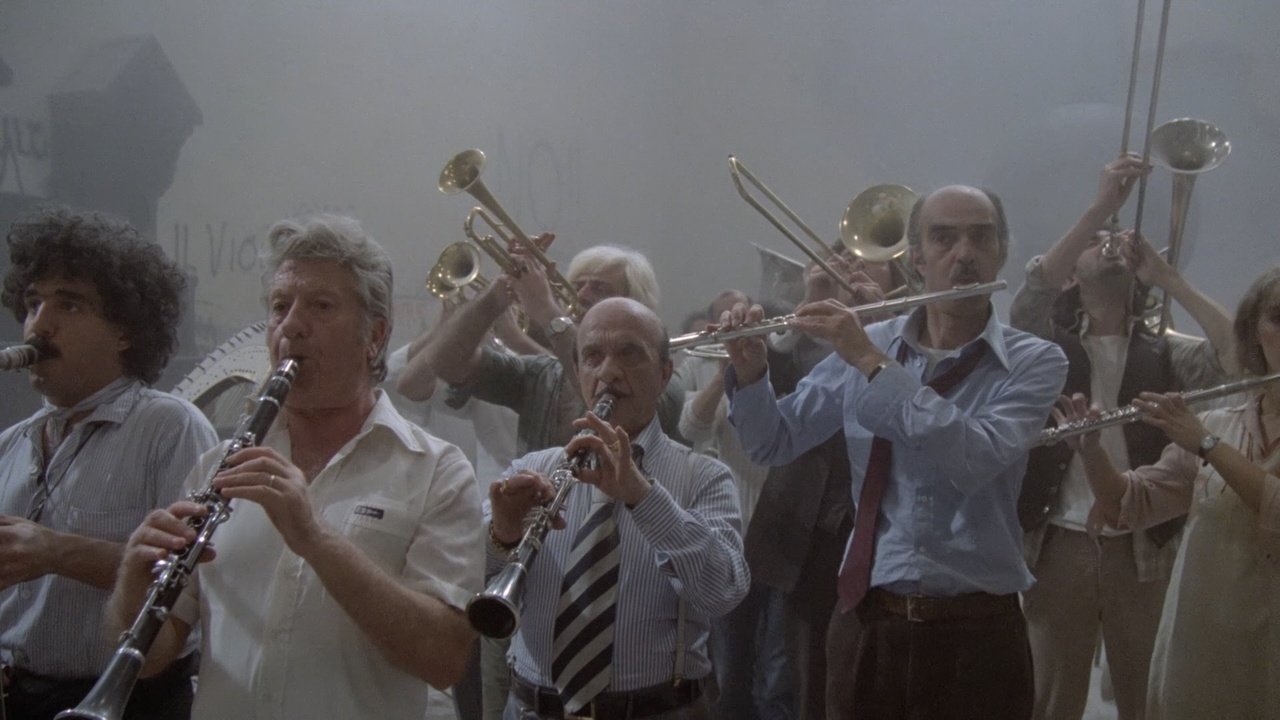johnnyboyz
There's an orchestra, and it rehearses. I wish there was more to it than that but such is the way of it. No doubt there will be those who'll attempt to create something more out of it than what it is we all saw; perhaps the temptation to some, that of dragging the issue of social commentary into the fray, will be too much to turn down. Granted, there is an undeniably DeMille-esque sense of chaos about the very final few scenes of Fellini's "Orchestra Rehearsal", wherein the madness and filth which suddenly erupts out of I'm-not-quite-sure-what reminds one of how those who had lost their faith at the end of DeMille's 1956 remake of "The Ten Commandments" trussed up a model of a farmyard animal and began worshipping it once it had been painted gold. They were, of course, eventually struck down for their sins, and when one observes a film such as Fellini's here depict something very classical, very high-culture essentially fall apart before further still descend into the sort of abject bedlam on show towards the end, one can very easily read into it as being a gradual decline to decency; morals and cultural affluence.The short and long of it is, however, that the film is a failed (although not without being wholly uninteresting) experiment that wasn't sure how it was meant to end. Several years ago, a revealing interview with American screenwriter Brian Helgeland (upon being asked about the nightmare process behind both his and the studio's idea of how 1999 film "Payback" might conclude) saw him criticise the version we all got for taking the easy way out: "If you have any doubts as to how to end a movie..." he would say, whilst reciting some tongue in cheek once advice given to him, "...set everything on fire". Federico Fellini wastes little time in establishing an orchestra as being a beautiful, constructive thing. Where sound effects not limited to busy traffic, soaring aircraft and emergency sirens combine to cause a terrific bombardment of noise that opens the film, an orchestra creating its own cacophony of sound eventually comes to occupy the frame in what is supposed to strike us as a pleasing, controlled burst of extravagant sound as opposed to before. This is no doubt the film announcing to us its opinion on the majesty that the orchestra carries, the brilliance of high-culture and how elevated it is in comparison to the everyday; to the normalised; to the regular. Everything else is just mundane by comparison.While thin on narrative, the 'story' of the piece is that of those involved in this large orchestra - that is to say, their arrival; their talking while waiting for others and what they think of the wider world beyond the confines of this hired hall. At one point, a mouse interrupts proceedings and some of the brasher male members of the troupe enjoy winding up the more finicky female members once it's been killed and is in hand. I'm not sure if it's known as to whether the mouse genuinely interrupted proceedings during the shoot or if it was a staged set piece, but the film certainly carries this fiction/non-fiction vibe throughout. The film is mostly shot from a mock-televisual perspective created by a fictitious TV crew who are there purely to capture the essence of what being in an orchestra is really like. The approach is problematic, something which sees the documentary that will be made out of the footage being collected not necessarily the thing we're observing now, but more-so the raw footage – fifteen minutes in, we begin to wish it were a documentary about an orchestra. One is reminded of that sequence from 1992 Belgian film "Man Bites Dog", wherein the individual about whom the faux-documentary is, can be seen editing the finished product we're watching. There, flair and ingenuity were at least applied to an approach even if the two films couldn't be any further apart in tone and the like.As a result, Orchestra Rehearsal is slow and boggy; it weighs us down with what are essentially outtakes that serve no other purpose than to bulk out the runtime of a film running at seventy minutes anyway. For a film about an orchestra, it would certainly have been nice to actually hear some classical music, but what we get are scraps of arguments – mere tidbits of dialogue which may have been improvised; may have been scripted or indeed may consist of a bit of both but ultimately leave us unmoved. The idea of a neo-realist piece depicting the days and times of an orchestra doesn't sound like a bad idea, but to distill it through the means on show here does not work. What we are forced into watching is an experimental piece, a piece wherein individual people say interesting things at various times but the content is largely irrelevant to anything that's happening. Stories about the gentleman who openly admits art has the power to make him cry and that he's clinically depressed because he preferred the way the world was once upon a time would make for good viewing – so too would an exploration of the hypothesis regarding how the members see their instruments as extensions of their bodies. What we get is something stoic, something shot without flair or invention; something that might've benefited from varying hues or filters to differentiate what the cameras reveal to what we alone are entitled to see. Not even Fellini's reputation of being a hands on Italian director prominent at the peak of his nation's neo-realist movement can bail him out here.
Mihnea the Pitbull
Some fully creditable critics deemed "Prova d'orchestra" as being Fellini's main masterpiece. Although recognizing their slight exaggeration, I still can fully empathize with their point. The movie is one of the most intelligent, stylish and personal instances of the much used (and abused) recipe of the "social microcosm". Of course, Fellini's trick to build up a parable of society by using the orchestra parallel is not only original, but also very efficient: the metaphors and symbols resulting from this are both powerful and humorous, in an atrociously satyric vein.Also, it's very interesting to note the gradual glissando from realism to hyperbole, and from cold detachment to paranoid hysteria; as such, what started as a pseudo-documentary, impartial and technical, gradually turns into a major pandemonium, to culminate with the hallucinatory profiling of the demolition iron ball, as an omen of doom - that being the point where the artist really meets the divine, both as meaning, and as means.One should also notice the masterfully style of shooting the orchestra, the people and the instruments, to build up the cinematographic symphony layered over the musical one, and to create that irresistibly fast-paced narrative in images, that makes the movie so exciting and captivating - it's literally to be watched on the edge on your seat, although nothing more spectacular happens than an orchestra rehearsing in a disaffected church... all being the result of Fellini's skillful cinematography.At last, one couldn't depart any reference to this masterpiece without mentioning at least in passing the haunting finale. Although I always regarded with political objectivity and historical honesty the national-socialist ideology, goals and means, I must confess that I fully assimilate Fellini's powerful warning about any dictatorial excesses. Balduin Bass' voice rising in a Hitlerian monologue is an efficient and pointed mean of expression and style - and his last line after fade out, "Signori... Da capo!", indeed MAKES A POINT!
nycritic
A somewhat failed experience, but still worth the watch. ORCHESTRA REHEARSAL has been considered a lesser Fellini and it shows -- the story is pared down to its essential, any dream sequence or sequences filmed out of context from the original story are nowhere to be seen, and the action takes place and resolves itself in what seems to be real time, which is the movie's 72 minute duration.It can be a political allegory or simply what it is at face value: people gathering together in locked quarters, coming from different walks of life, being introduced to each others, telling bits and pieces of their life stories through the instruments they play, with the occasional commentaries indicating a self-importance that these people have of their position in the "orchestra".That it takes place in a burial ground for popes enhances its symbolic value and Fellini's attitudes towards religion and religious figures and their relationship to the common people and vice versa. Interesting to see that the conductor is the only person in authority and happens to be German -- it made me wonder what Fellini might be trying to say here, but it seems to express an aversion to tyranny as the conductor is not what I would call an easy person to get along with. Even when he yammers in soft tones there is a harshness about him that is telling. He wants the musicians to perform beauty, art in music, and berates them horribly for not doing so. It then becomes not a "will they revolt" as to a countdown to their revolt -- people in general will not tolerate micro-management of any kind for more than they have to, and that in fact could be another of the film's many interpretations if applied to an office setting of a company considered a "sacred rock" of industry. It's an even more visually punch when Fellini bulldozes the auditorium at the very climax -- it's as if the movie would have folded itself outwards into the realms of Fellini the director to Fellini as God striking this place dead in its tracks to have order being restored; it's an arresting sequence, powerful in meaning, and one that elevates this short movie from what would have been an unremarkable experience.
xenophil
This miniature movie's tempo builds, stops and starts in that comical, jerky way characteristic of Fellini. It's one of the things I like.The interviews are a riot!It appears to be a parable of the last few hundred years of European history.


 AD
AD

